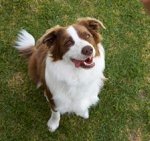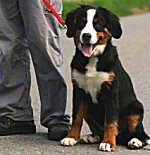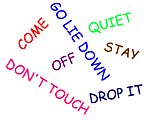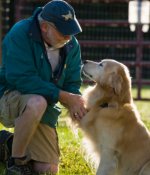Anatolian Shepherds: What's Good About 'Em, What's Bad About 'Em
Anatolian Shepherd temperament, personality, training, behavior, pros and cons, advice, and information, by Michele Welton, Dog Trainer, Behavioral Consultant, Author of 15 Dog Books
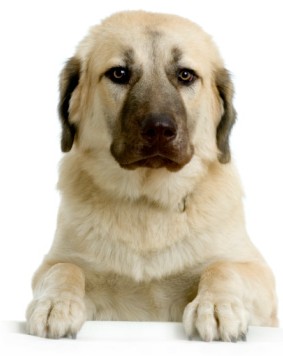
The rugged Anatolian Shepherd is not inclined to play fetch or Frisbee, nor should you expect animated responsiveness.
Developed strictly for utilitarian purposes, as a guardian of livestock, the Anatolian Shepherd is typically serious and dignified, calm and quiet – unless challenged by an intruder (animal or human).
Livestock guardians bond with flock animals (such as sheep) with fierce possessiveness. They make their own decisions about who is a friend and who is a foe, what is a threat and what is not, and they react to every situation as they see fit.
Potential owners who don't have the experience to control these powerful instincts should look for another breed. Anatolian Shepherds are not casual pets. They are dominant, self-reliant dogs who will try to manage everyone and everything unless you are an assertive leader who knows how to instill respect.
This breed requires a formal introduction to strangers before being touched by them, and he will remain vigilant every moment they are on his territory.
He is patient with his own children and with submissive family pets. But he should not be expected to welcome those from outside his family.
Despite his bulk, the Anatolian Shepherd Dog is remarkably agile and reactive. He needs a spacious yard with a six-foot-high fence that is extremely secure.
If you want a dog who...
- Is large and rugged, yet agile and athletic
- Will protect your horses, llamas, sheep, goats, and chickens
- For his size, needs only moderate exercise
- Is steady and dependable, rather than playful
- Is serious and reserved with strangers, but not aggressive unless provoked
An Anatolian Shepherd may be right for you.
If you don't want to deal with...
- A very large dog who takes up a lot of space
- Providing enough exercise to keep him satisfied
- Massive destructiveness when bored
- Suspiciousness toward strangers
- Aggression toward animals who don't belong to his family
- Providing six-foot fences and lots of supervision to prevent wandering
- Strong-willed mind of his own, requiring a confident owner who can take charge
- Deep booming barks, especially at night when he hears a sound
- Heavy shedding
An Anatolian Shepherd may not be right for you.
 |
Dog Breed Traits – Which Traits Are Right For You? In this brand new series, I'll help you decide which dog breed traits would best suit you and your family, your home and yard, and your lifestyle, so you can choose the best dog breed for your family. |
Keep in mind that the inheritance of temperament is less predictable than the inheritance of physical traits such as size or shedding. Temperament and behavior are also shaped by raising and training.
FREE eBooks by Michele Welton
![]() "Respect Training for Puppies" and "Teach Your Dog 100 English Words" are free step by step guides to teaching your pup to be calm and well-behaved.
"Respect Training for Puppies" and "Teach Your Dog 100 English Words" are free step by step guides to teaching your pup to be calm and well-behaved.
![]() "11 Things You Must Do Right To Keep Your Dog Healthy and Happy" is a free guide to keeping your dog mentally, physically, and emotionally happy and healthy so you can enjoy a longer lifetime of companionship.
"11 Things You Must Do Right To Keep Your Dog Healthy and Happy" is a free guide to keeping your dog mentally, physically, and emotionally happy and healthy so you can enjoy a longer lifetime of companionship.

More traits and characteristics of the Anatolian Shepherd
If I was considering an Anatolian Shepherd Dog, I would be most concerned about...
- Providing enough exercise and mental stimulation. Anatolian Shepherds MUST have regular opportunities to vent their energy and do interesting things. Otherwise they will become bored – which they usually express by barking and destructive chewing. Bored Anatolians are famous for chewing through drywall, ripping the stuffing out of sofas, and turning your yard into a moonscape of giant craters.
Anatolian Shepherd Dogs are most satisfied when guarding livestock. You can substitute pulling a cart or sled, or advanced obedience, or tracking, or a similar canine activity. But if you simply want a casual pet for your family, I do not recommend this breed. Anatolians were never intended to be simply household pets.
- Potential suspiciousness. Anatolian Shepherds need extensive exposure to friendly people so they learn to recognize the normal behaviors of "good guys." Then they can recognize the difference when someone acts abnormally. Without careful socialization, they are likely to be suspicious of everyone.
- Potential animal aggression. Most Anatolian Shepherds will treat the pets in their own family as members of their flock. However, they have strong instincts to drive away (even kill) animals who do not belong to their family.
To keep your Anatolian Shepherd in, and to keep strangers and other animals out, fences should be high, with wire sunk into the ground along the fence line to thwart digging. Gates should have the highest quality locks.
- The strong temperament. Anatolian Shepherd Dogs have an independent mind of their own and are not pushovers to raise and train. Many Anatolians are willful, obstinate, and dominant (they want to be the boss). To teach your Anatolian Shepherd to listen to you, "Respect Training" is mandatory. Read my free online training programs.
- Heavy shedding. Anatolian Shepherds shed a good deal. If your dog is indoors rather than outdoors with his flock, you'll find hair and fur all over your clothing, upholstery, and carpeting.
- Noise. Anatolian Shepherds have a deep, booming bark which they use freely, especially at night when they are most vigilant. You should really live on a farm or ranch away from close neighbors.
My best-selling books – now available FREE on my website
 Respect Training For Puppies: 30 seconds to a calm, polite, well-behaved puppy is for puppies 2 to 18 months old. Your puppy will learn the 21 skills that all family dogs need to know. Click here to read for free.
Respect Training For Puppies: 30 seconds to a calm, polite, well-behaved puppy is for puppies 2 to 18 months old. Your puppy will learn the 21 skills that all family dogs need to know. Click here to read for free. Teach Your Dog 100 English Words is a unique Vocabulary and Respect Training Program that will teach your adult dog to listen to you and do what you say. Click here to read for free.
Teach Your Dog 100 English Words is a unique Vocabulary and Respect Training Program that will teach your adult dog to listen to you and do what you say. Click here to read for free. 11 Things You Must Do Right To Keep Your Dog Healthy and Happy helps your dog live a longer, healthier life. Get my honest advice about all 11 Things before you bring home your new puppy, because some mistakes with early health care cannot be undone. Click here to read for free.
11 Things You Must Do Right To Keep Your Dog Healthy and Happy helps your dog live a longer, healthier life. Get my honest advice about all 11 Things before you bring home your new puppy, because some mistakes with early health care cannot be undone. Click here to read for free.Related posts you might enjoy



